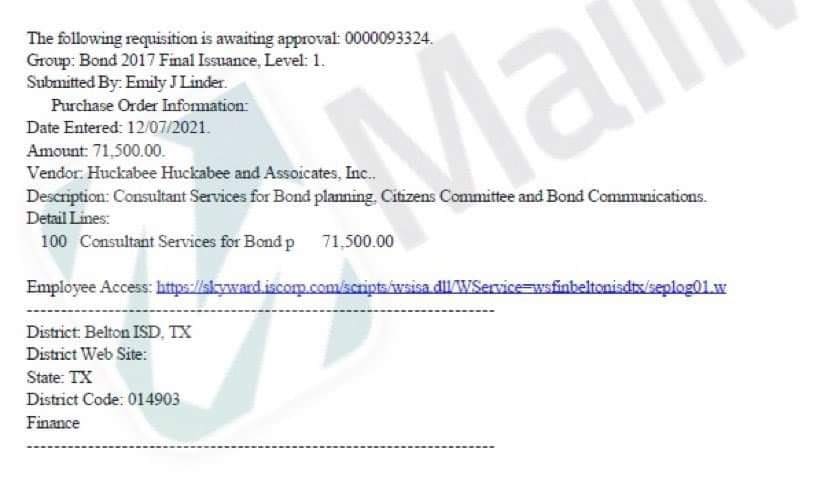UPDATED June 3, 2022 to include a bond consultant purchase order.
Officials in yet another Texas school district have been caught boosting passage of property tax-backed bonds worth millions by monitoring which district staff and parents had voted and urging administrators to make “a strong push” to get out the vote.
Belton Independent School District in Central Texas had two bonds on the May 7 ballot totaling $174 million.
Whistleblower documents shared by Corey DeAngelis of the American Federation for Children show that on May 2, Belton ISD Superintendent Matt Smith emailed “all principals” and several other administrators in the district about the bond election:
According to Bell County data, as of Thursday we had 228 staff members that have voted and 246 parents that have voted.
Please ensure you have a strong push with staff and parents for early voting and for election day on Saturday!
A slide from a community bond presentation by Deputy Superintendent Malinda Golden stated that if the bond failed, “funds that would otherwise be directed to salaries” would instead go to buildings and repairs—an appeal to the district’s 2,090 employees to vote for the bond.
Voters approved the two school bonds by margins of 41 votes and 2 votes.
“Belton ISD monitoring staff and parent voting numbers is disturbing, but hardly surprising,” said Lou Ann Anderson, a local government watchdog who has written extensively on school bond elections in Bell County.
“It tracks with other aggressive, questionable bond campaign tactics that included sending materials home in student backpacks—stickers for the kids, brochures for the adults—and unprofessional verbal targeting of bond opponents,” she said.
Belton isn’t the only Texas school district caught overzealously promoting big bonds this year.
Last month, the Texas Education Agency launched a criminal investigation into Northside ISD in San Antonio, where officials’ electioneering to boost a $992 million bond may have crossed into coercion.
Whistleblower documents also exposed by DeAngelis showed Northside’s superintendent promoting their bond with messaging similar to Belton’s, and the district made it known they too were tracking which employees did and didn’t vote in the election.
One principal also told campus employees they were “expected” to vote “for” the bond—a message the district later called a “miscommunication.”
The TEA and Gov. Greg Abbott called it “likely a crime.”
It’s a violation of the Texas Election Code for school districts to use taxpayer resources to advocate for or against political candidates and measures. It’s also a crime to coerce a voter to vote a certain way.
Yet school officials are rarely penalized for electioneering, and any minimal fines imposed are worth the high-dollar payoffs for districts (and contractors) when bonds pass.
Whether the vote-tracking tactic runs afoul of the law, it’s one superintendents across the state are using, as revealed at a workshop at this year’s SXSW EDU education conference on strategies for passing school bonds.
Districts’ bond advertising and promotional strategies often look the same because many receive marketing advice from the same big school construction contractors who benefit from the bonds’ passage—like Huckabee, Inc., whose CEO moderated the SXSW EDU panel.
A purchase order dated December 7, 2021 shows Belton ISD paying Huckabee $71,500 for “Consultant Services for Bond planning, Citizens Committee and Bond Communications.” “The new evidence suggests this might be more of a widespread issue in Texas,” DeAngelis told Texas Scorecard.
“The new evidence suggests this might be more of a widespread issue in Texas,” DeAngelis told Texas Scorecard.
“Superintendents can build their empires by unethically pressuring subordinate employees to vote in low turnout elections,” he said, adding that Belton and Northside essentially threatened employees by predicting cuts to budgets and salaries if the bonds failed.
“At minimum, districts should be investigated when this kind of evidence surfaces, so that district leadership doesn’t feel so emboldened to pressure their employees to vote,” he said. “Lawmakers could also consider making these elections aligned with the general election, so more voter voices are heard on education issues, as opposed to special interests largely controlling the outcomes.”
More school district whistleblowers in Texas can speak out by submitting evidence anonymously to DeAngelis at the new Corruption Tip Line.





